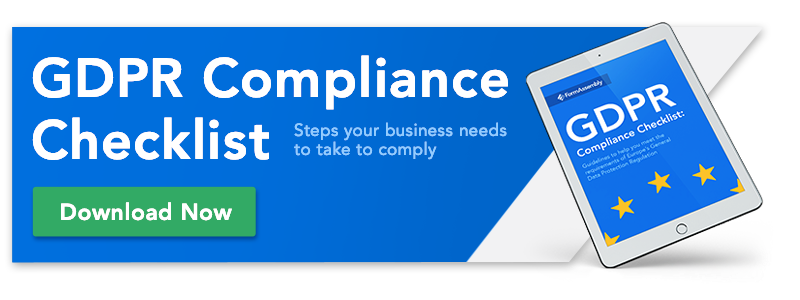Keep up with FormAssembly’s press mentions, from guest posts to use case interviews to insightful quotes. Topics covered include remote work, data security, GDPR data best practices, and much more. Follow along with updates on the Press page.
Article: “GDPR One Year Later: How To Navigate The Data Collection Minefield“
Author: Cedric Savarese, Founder and CEO of FormAssembly
Website/publication: Forbes Technology Council
Article summary:
In the Forbes Technology Council article written by Cedric Savarese, he discusses:
- How GDPR places more accountability on businesses for safeguarding GDPR protected data and allows consumers to have a more active role in how their data is being collected
- What companies can learn from the mistakes of those who violated GDPR data regulations
- The role of transparency in receiving informed consent to use and collect consumer data
The highlights:
Cedric Savarese on the importance of informed and active consent in GDPR data collection:
“Savvy consumers are also catching on to this type of deceptive marketing [pre-ticked boxes], and organizations would do well to steer clear of such practices. The foundation of data collection should be informed and active consent. The consumer must be able to freely choose to share personal data.”
Cedric Savarese on consumers’ involvement with their data:
“Another provision of GDPR is that consumers now have the right to ask businesses for access to any personal data that has been processed. They also have the right to request that the data be corrected or deleted. In order to limit liability, timely and orderly processing of such consumer requests is needed.”
Cedric Savarese on only collecting data that is necessary:
“In order to minimize your exposure, you should also only collect the data you know you need — also known as the Data Minimization Principle. Though it may be tempting to ask for additional information, just in case it might be useful in the future, the practice is incompatible with disclosure and transparency. That is, since the future use of such data is undetermined, you can’t possibly provide the disclosures needed for real and informed consent.
The article can be in found in full here.

Why GDPR-compliant forms matter
GDPR protects the privacy of EU citizens by giving them control over their personal information. Using GDPR-compliant web forms demonstrates your commitment to data security and fosters trust with potential customers and users. By prioritizing GDPR compliance in your data collection and data processing and in the third-party technology tools you use, you reduce your risk of receiving a GDPR data breach notification and build stronger relationships of trust with your client base.

